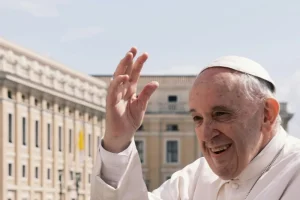Coronavirus and the post-pandemic world: a new War
Not long ago we wondered whether the coronavirus would change the world for the better. Now, with a new war raging in the heart of Europe, with Russia and Ukraine engaged in a bloody conflict, the answer is clearer: only good people improve our common home.
Having seen the impact of the coronavirus on mental health, we enter an uncertain, but always hopeful, future. The waves of coronaviruses still active in various countries have been diluted by war news. Many of the ideas that appeared in this article when it was published have become reality.
“They return to a very different land.” That was the headline on the return of three astronauts back to earth from the space station on Friday, April 17, 2020. They had been in space for over 200 days.
For us, though, the “news” is uncertain: when will this new virus disappear? Will we return to “normality”? Will the world be better after this unique storm?
Probably, from the month of May onwards, I wrote in 2021, it would be possible to walk in the streets with fewer restrictions. It is not yet clear what the recommendations of the World Health Organization and governments are. In some places, the use of masks is mandatory in various means of transportation, airports, meetings of more than 10 people, elevators, etc…
When traveling by air, a distance of maybe 2 meters between each person should be observed. This means leaving about 26 seats vacant for every 4 passengers. Will airline companies survive? You may also need to prove you have tested negative for coronavirus.
Social relationships will change. Will it be possible to shake hands or hug again? Will it be possible to go to a movie or watch a football match? When will the parties, the conferences, the classes be allowed to resume? How long will we use Zoom, Skype, Hangouts… which are as effective as they are at times exhausting?
There are predictions that robots might be employed to receive people at the reception desks of hotels or hospitals, to give medicines and food to the elderly, to write medical records for patients, to check passports, to unlock bank accounts and to answer calls online… Will robots be able to serve others with selfless love?
There are many questions that arise and even greater is the hunger for the sacred. Christians have great yearnings for Holy Mass and Communion. The Jewish people ask for their assemblies in the synagogue, the Moslems for their prayers in the mosque and their Ramadan.. When will our temples and places of worship be reopened?
It is estimated that the pandemic will last about two years. During this period, the virus will circulate more or less aggressively and sporadic outbreaks of infection will occur. It is expected that from September 2020 there will be a vaccine in the experimental phase, or perhaps an effective drug will be discovered first.
A bit of history about good and bad people, pandemics and wars
Now, back to the question: will the world be a better place after this tempest? History shows that no storm by itself makes men better. And there is no need to recall the rains of sulfur or the universal deluge of the Old Testament. Just look at the people of our milieu.
The flu pandemic of 1918 caused between 50 and 100 million deaths. Life expectancy in the United States dropped from 52 to 39 years. Shortly afterwards, a similar number of people died, this time not from a virus, but from the depraved will of men, in a Second World War.
More recently we had two major coronavirus epidemics: SARS-Cov in 2003 and MERS-Cov in 2013. And another virus, Ebola, caused more than 11,000 deaths between 2013 and 2014 in Guinea and Sierra Leone. And it doesn’t look like the world as a whole is getting better…
Numerous armed conflicts are plaguing the planet.
The statistics of recent months show a decline in crime rate due to confinement. But have the criminals been converted? Many organized criminal elements have taken advantage of the situation to continue killing.
In March 2020, when the health emergency situation in Rome reached its peak, they stole from a hospital the hard disk of a newly installed computer designed to detect coronavirus. Google warned that every day scammers send 18 million messages related to coronavirus, to prey on unsuspecting users. And there are still many other crimes, egocentric statements and political struggles, coarse lies and plots of all sorts.
Good people are the ones who manage to change the world and avoid wars
Anyway, in any calamity there have always been flickers of light, of hope, of humanity, that shine forever and change the course of history…
Some are very well-known and others less so. In the terrible dramas of the Second World War, for example, Blessed Franz Jägerstätter stands out: an Austrian farmer who died a martyr’s death because he did not want to adhere to a perverse ideology. He passed unnoticed, yet left an indelible mark portrayed in a film entitled A Hidden Life.
In recent weeks, we have also witnessed the heroism of countless good people who silently give themselves to the service of others. Many nurses, doctors and health workers are risking their lives.
There are also those who run supermarkets, anonymously clean the streets, supports family life by taking care of children, overcome laziness and take an online course, or stay up late to keep internet service running.
Among many concrete examples, I remember a parish priest in northern Italy, who gave up the artificial respirator offered to him, so that it could be used by a young boy.
I have in mind a stretcher-bearer from a hospital who, dressed in his personal protective equipment similar to that of an astronaut, told me how he enjoys carrying sick people from one place to another, talking to them, listening to them.
And the chaplain of the largest Spanish field hospital, who said in an interview: “When you come here, you think that you will be the one to give the interpretation keys, but the key is given to you by the sick, and it consists in listening with love”.
We all need to be heard. Giving and receiving a smile is free. In the article on the impact of the coronavirus on mental health, I mentioned the contagion of negative emotions. But there is also a good contagion of positive effects. One’s heart could thaw, become transparent and free, if we strive to be cheerful. Joy requires hope, love, tranquility, optimism and security… And it makes the world a better place.
Friendship that transforms and prevents wars
In this context, friendship is the key to getting out of pessimism. Friends listen to us and make us feel good. A few days ago I read a letter written by someone to a mutual friend of ours, a great mountaineer, which contained these appreciative phrases:
- You gave me so much, without ever asking for anything in return;
- you taught me how to walk on mountain paths and silently bear the weight of the backpack and physical tiredness;
- you taught me that when you try to reach the summit, every step is important and you must not be distracted;
- you taught me that when you put your mind to it, results and satisfaction always come sooner or later;
- you taught me the joy of being able to contemplate the sunrise or sunset from the top of a newly reached summit;
- you taught me the pleasure of sharing your food and water, even when they are scarce;
- you taught me to appreciate the simple things of every day and to look at life as a gift of inestimable value;
- you taught me to understand things I didn’t know, without ever making me feel ashamed of my ignorance;
- you made me rediscover faith and the pleasure of finding the presence of Our Lord in everything around us.
These phrases could very well be a good life “master plan” to transform the world. Give yourself to others, serve them, try to be their friends, share or respect their ideals, and forgive. Here, we also find our specific path:
- Self-transcendence: to get out of yourself to God and to others;
- Good life or virtuous life, of one who strives to do good;
- Consistency, of one who seeks the means to reach the goal;
- Dialogue, with those who think differently;
- Empathy, from one who understands the feelings of others, because he knows his own feelings.
There is, therefore, a big room for hope, joy and good humor, which is a remedy for many evils. With God’s help, we can emerge from this pandemic as better people, more attentive to the needs of others, starting with those around us.If we change ourselves, the world will change.
I’ll transcribe the closing lines of the above letter: “I wish I had been close to you in your last moments of life and embraced you one last time, so that I could make you feel everything you meant to me.
I want to remember you imagining you once again, with sure step, leading me and guiding me to the most important peak of all, the one that awaits every human being at the end of his or her days, preparing the way for me as you have always done and waiting patiently as I come strolling. Thank you! and we will continue to rejoice together in the goals we have achieved.”
The recipient of the letter was Michelangelo, a priest and professor, with whom I too have climbed many mountains. A few days ago he has left us because of a coronavirus infection. People like him, or Blessed Franz, who serve others discreetly, change the world. We don’t know if the pandemic will improve the world, but it could certainly propel us towards a “new normality” and to pray more for the peace.
Wenceslao Vial
Bibliography
Be Who You Are. Developing your Christian Personality, Scepter, 2019







0 Comments